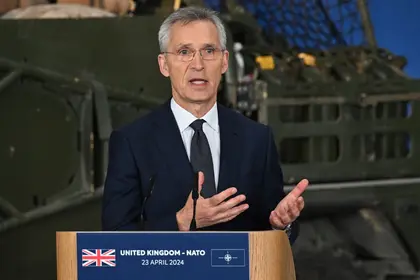NATO chief Jens Stoltenberg said Thursday it was "not too late for Ukraine to prevail" against Russia as long as its allies fulfil promises to deliver more weapons.
"In recent months, NATO allies have not provided the support we have promised," he said in a speech on a visit to Berlin.
JOIN US ON TELEGRAM
Follow our coverage of the war on the @Kyivpost_official.
"But it is not too late for Ukraine to prevail, because more support is on the way."
Ukraine has suffered setbacks on the battlefield against Russia's forces due to ammunition and weapons shortages.
But Stoltenberg noted that the US Congress had finally approved a bill to provide billions of dollars in support for Ukraine, and other countries including Britain, Germany and the Netherlands had made new pledges.
"It is now our responsibility to turn these commitments into real deliveries of weapons and ammunition -- and to do so quickly," he said.
Stoltenberg also took a swipe at China, accusing Beijing of "propping up Russia's war economy" by sharing high-end technology that can be used to produce missiles, tanks, and aircraft.
"China says it wants good relations with the West. At the same time, Beijing continues to fuel the largest armed conflict in Europe since World War Two," he said, warning that "they cannot have it both ways".
Berlin and Beijing have traditionally enjoyed close economic ties, with German companies investing huge sums in China and exporting goods in massive quantities to the world's number two economy.

Trump Makes 90 Day Foreign Aid Freeze – Ukraine Military Support Supposedly Untouched
But after the energy shock caused by the Ukraine war hit Germany's crucial manufacturers particularly hard, pressure has been growing on German firms to reduce their dependence on authoritarian China.
On a visit to China last week, Chancellor Olaf Scholz stressed however that Germany did not want to "de-couple" from China, rather it was seeking to reduce "one-sided dependencies".
You can also highlight the text and press Ctrl + Enter










